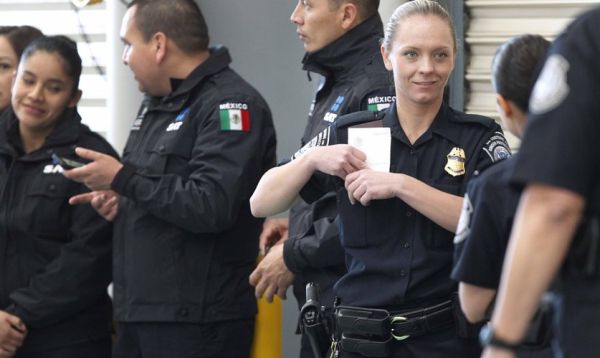Tijuana, Baja California, Mexico - U.S. authorities began working Tuesday on Mexican soil for the first time to inspect trucks bound from Tijuana to the United States as part of a new enforcement program intended to reduce congestion and speed cargo across one of the nation's busiest border crossings.
The joint inspections by U.S. and Mexican officials were launched after Mexican lawmakers overcame resistance and approved changes to the country's firearms law to permit foreign customs and immigration officials to be armed on the job.
"The benefit is very simple - avoid double inspection," Mexican Treasury Secretary Luis Videgaray said at the joint facility in Tijuana's Mesa de Otay section, a few blocks from the border crossing.
The impact was difficult to gauge as U.S. and Mexican officials marked the occasion by letting a shipment of strawberries head to San Diego.
Trial runs last week cut waiting times in half, said Arazeli Penilla, compliance officer at Driscoll Strawberry Associates Inc.
Inspections by U.S. officials initially will be limited to agricultural products deemed low risk for carrying pests or disease.
Truckers arriving at the former electronics plant stop at separate windows staffed by Mexican and U.S. inspectors who decide if they must pull aside to have cargo scanned. If cleared, they can drive through a walled area into San Diego.
In October, Mexican officials began inspecting Mexico-bound electronics, automotive and aerospace parts alongside U.S. counterparts at Laredo International Airport in Texas. Later this year, U.S. authorities plan to begin inspecting trucks of U.S.-bound computers in San Jeronimo in the Mexican state of Chihuahua, near the border cities of Ciudad Juarez and El Paso, Texas.
Cargo has long been inspected in the U.S. and in Mexico - an exercise that can take several hours. The new "pre-inspection" facilities effectively meld two stops into one.
"It just makes an awful lot of sense," said U.S. Customs and Border Protection Commissioner R. Gil Kerlikowske, who hopes to expand the program to other crossings with Mexico and Canada.
The latest demonstration of closer border ties came a month after a group of U.S. and Mexican investors opened an air terminal in San Diego with a bridge that crosses a razor-wire border fence to Tijuana's airport, believed to be the only cross-border airport outside the European Union.
The larger significance of joint cargo inspections is that U.S. and Mexican officials will work under the same roof, sharing intelligence and other information, said Christopher Wilson, deputy director of the Woodrow Wilson Center for International Scholars' Mexico Institute.
"They're going to get to know each other better than ever before," Wilson said. "This is really joint border management in its early stages."
Plans for the joint inspection facilities have been in the works for a long time but faced resistance in Mexico over allowing armed U.S. agents to do the work.
"Mexico has been very sensitive about U.S. agents operating on Mexican soil for the last couple centuries, since the Mexican-American War but particularly since the 1980s," Wilson said. "It's an issue of national sovereignty. The fact that they are willing to do this shows Mexico doesn't just have a narrow conception of what that means."
Source: abcnews.go.com


